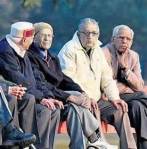 The US based Centre for Disease Control and Prevention (CDC) reports that hundreds of thousands of elderly Americans are abused annually and the problem is so serious that an Elder Abuse Day has been declared in that country. Within the past week I have heard three horrifying stories of elder abuse – one in China, one in the US and one in Jamaica. In the China case an elderly woman had to sue her relatives in order to get them to care for her. The US case is horrific – a woman with a broken femur left to suffer in unbelievable pain for months until her screams finally drove the family to seek care, and the Jamaican one – a man left almost helpless in a backroom infested by insects. These are likely to be the tip of the iceberg and we cannot imagine how many undiscovered cases exist.
The US based Centre for Disease Control and Prevention (CDC) reports that hundreds of thousands of elderly Americans are abused annually and the problem is so serious that an Elder Abuse Day has been declared in that country. Within the past week I have heard three horrifying stories of elder abuse – one in China, one in the US and one in Jamaica. In the China case an elderly woman had to sue her relatives in order to get them to care for her. The US case is horrific – a woman with a broken femur left to suffer in unbelievable pain for months until her screams finally drove the family to seek care, and the Jamaican one – a man left almost helpless in a backroom infested by insects. These are likely to be the tip of the iceberg and we cannot imagine how many undiscovered cases exist.
In the Caribbean our small size means that we often live closer to our parents and grandparents but it’s also true that many families are separated because of migration. The family system is also not as robust as it once was and demands of jobs and family may mean less attention and time for seniors. Add to that the fact that people are living longer and often beyond their finances and you can see that some seniors are in vulnerable situations and open to abuse.
Abuse isn’t always physical. In fact the CDC says that there are six types of elder abuse – physical, sexual, emotional, neglect, abandonment and financial abuse. The elderly may be abused by the very people on whom they depend for daily care and therefore many are afraid to speak out and tell someone of the abuse. It may be perpetuated by family members (including spouses) who appear loving to others and elder abuse can occur anywhere including expensive nursing homes so there really are no guarantees. It may occur because of stress with burnt out caregivers or because people are just unscrupulous and taking advantage of a weaker person. Whatever the cause it is unacceptable.

The best defense against elder abuse is the loving care and attention of at least one other person who is observant to the signs. Signs include:
– Bruises, pressure marks, broken bones and burns
– Unexplained withdrawal from normal activities, depression, change in alertness
– Sudden changes in financial situations
– Frequent arguments between the elderly person and the caregiver
– Humiliation and ridicule of the elderly person or scapegoating and blaming
– Ignoring or isolating the elderly person
– Charges for health care that do not appear to be provided
– Over or under medicating
There are many other signs which you should familiarize yourself with if you have any reason to be concerned about an elderly person that you know. This site is a good place to start – http://www.helpguide.org/mental/elder_abuse_physical_emotional_sexual_neglect.htm
If you suspect elder abuse you must act. Asking the elderly person may or may not be helpful because many are afraid to speak or may be conflicted about reporting abuse by a relative to someone. Do some investigation to verify your suspicions. For example roll up a sleeve to check for bruises if you suspect physical abuse and watch carefully when the elderly person is being moved or is moving to see if there is pain. Pay attention to the dynamics between the caregiver and the elderly person paying particular attention to body language. Question financial irregularities and don’t be satisfied with pat responses. Don’t just settle for visiting an elderly person in a shared area or verandah, take a look at their bedroom. Ask trusted family members or friends to observe and give their opinion.
It will probably be necessary to remove the elderly person from the care of the caregiver and in many cases to make a formal report to the authorities. You should definitely do the latter in the case of an institution that has care for other seniors – don’t settle for just safeguarding your senior. Others need protection as well.

It has been said that we judge societies by the care that they give to their most vulnerable and that includes the elderly. After giving a lifetime of service to others many of them will need others to help them. It’s not a job that we can or should turn down.










